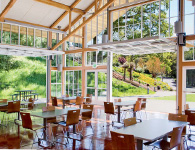Text by Natalya Savka | Photography by Lana Slezic
***
Back home, in Kadavu Island's mangrove forests and fringing coral, Moceiwasa catches emperor fish and skipjack tuna. Her son spears sharks. "My home smells like coconut milk and mangoes and piglets." The weather is "regular."
No roads or power lines lead to the village of Naioti. Of its 34 houses, 28 sit empty, abandoned by locals who escaped to the city. Suva, Fiji's capital, lies about 55 miles north by boat, or as Moceiwasa says, "Forty-five dollars away, each person, each way." She never aspired to a life in the city, where, she says, "you need money to eat and then you need money to go to the toilet." Her husband's crops bring in 500 Fijian dollars (about US$280) annually. Half of that she spends on kerosene.
As a child, Moceiwasa wanted to marry a farmer because her father was a farmer, and then she did marry a farmer, and so did three of her daughters. Each of her 51 years passed by in much the same way as the one before it. She boiled fish. Pulled up yams. Wove coconut-leaf mats and fans. For more than two decades, she volunteered as her village's only health worker. For stomachaches, she prescribed the leaves of the physic nut tree. For coughs, rough lemon leaves.
"Only God paid me."
She is ordinary and proud. Her island still has clean blue seas, more than 75 percent of its forests, and a population of about 10,000. On Kadavu, it's easy to question the dogma of progress.
She won't talk about Kadavu's mosquitoes or about the loneliness of her village's empty plywood houses. Shewon't say a word against her husband. At a distance of 7,500 miles, her sunny memory of home brightens whatever its reality might be. (Similarly, the Chileans speak dreamily of their coastal cliffs, the Peruvians of their mountains.)
Moceiwasa left for the Barefoot College because her children encouraged her to go (they wanted her to see the Taj Mahal), her neighbors complained about rising kerosene prices (a 26 percent increase from 2005 to 2008), and her husband gave her permission.
Moceiwasa and her fellow countrywomen speak most comfortably in the first-person plural, as in, "We Fiji women are Christian women."
"We Fiji women come from paradise."
"We Fiji women are sick of this curry and chapati."
***
Moceiwasa is sitting in front of an air cooler that sounds like a plane taking off when, suddenly, the classroom's solar generators turn off. Her soldering iron cools. So she lies facedown on two stools and says, "I am not here, my daughter." The classroom quiets. The air thickens.
It's late in the afternoon. Little plastic bags that just this morning contained circuits and switches now billow out the back door, past the chipped water bowl that's tied up into a tree with used electrical cables. Through the dry summer, the bowl hydrates woodpeckers, babblers, and mynahs.
Beneath the bowl, there's Reapi Vaitalea from Fiji, punching the digits of her cellphone. Ants crawl between her toes. She paces through sand prints of plastic flip-flops and bare feet and leather
jutti—traditional local shoes that protect feet from snakes and scorpions.
When Vaitalea returns to the classroom, she announces, "No network connection," and the women collectively groan.
Then Moceiwasa sits up. She drums her fingers against the workbench. Lautaini Nabua, the Fijian across the table from her, joins in.
"Meda mai taura tale na bogi," the two women sing. By "tale," all 10 Fijians have joined in, dividing themselves into altos and sopranos.
"Let's dance in the night," they repeat in Fijian.
Vaitalea spins around and bangs a plastic Fanta bottle against her thigh. At the other end of the room, the four women from Rwanda add a stomp. The two from Burundi play imaginary zithers. Sharma sticks bindis (traditional Indian dots) on unsuspecting foreheads. Peruth Masoyinyana, from Rwanda, yells out the colors in English, adding an "ah" to the end of words and squeezing "en" between them: "Red-ah en yellow-ah en blue-ah."
When the song ends, the women sit back down. Slump forward. It's 5 p.m. "Class finished." Continue reading >>

Oberlin professor David Orr turns everything emerald.

Ditching the cubicle for a summer outdoors.

Energy efficiency without a big brick box.